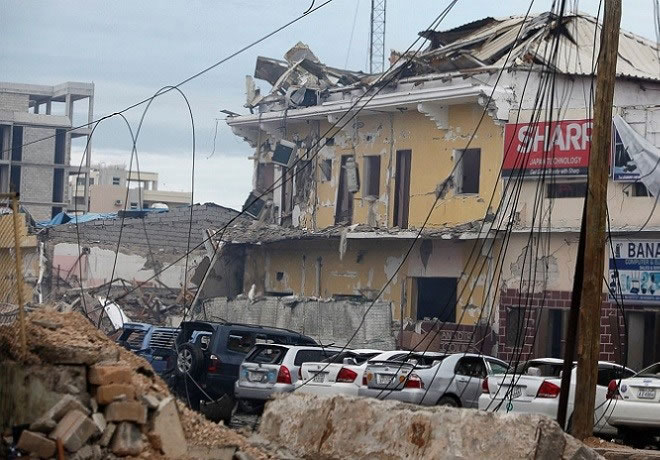Mohamed Shire
Monday, June 27, 2016

A view of the Nasahablod Hotel, destroyed after a bomb attack in Mogadishu, Somalia, Saturday, June 25, 2016. A Somali police officer says a suicide car bomber detonated an explosives-laden vehicle at the gate of a hotel in Mogadishu followed by gunmen who were fighting their way into the hotel..(AP Photo/Farah Abdi Warsameh)
Yesterday saw another day of tragedy in Mogadishu. We mourn the deceased and pray for those injured for a speedy recovery. We knew all along that the enemy never bothered about the sanctity of human lives nor the holy month of Ramadan when the faithful reflect on past deeds and supplicate to the almightily for forgiveness. Mogadishu residents like any other Somali city residents were looking forward to this blessed month but this was shattered not once but twice.
Now it was Nasahablod Hotel, the second hotel attacked within a month, leaving a trail of destruction and unimaginable grieve. According to hospital records, the death toll is said to be around 16 and over 55 those injured. Among the deceased unfortunately now included Hon Burci Hamza, the State Minister for Environment, who was missing yesterday but his death was confirmed today.
I am deeply touched by the death of Hon Burci. I spoke on the phone to the Marxuum (deceased) around noontime the day of the terror attach. We agreed to meet the following day at the Nasahablod Hotel not knowing that this will be our last conversation let alone meet (Rest In Peace). Equally painful was the earlier attack on 01 June on Ambassador Hotel where we lost two Somali MPs: Abdullahi Jama Kabaweyne and Mohamoud Mohamed Gure among other citizens. Note the people didn’t recover from that tragedy and the physical scars on buildings are still there as you drive by.
People of this city had, over the years, gone through major trials and tribulations; their patience has been tested at times. Nonetheless, they have shown greater resilience in the face of calamity after calamity. However, I know sense that they are now fed up with lacklustre excuses on security and are asking serious questions about the government’s ability to secure the city.
The basic responsibility of any government is the protection of life and property of its citizens. The security of Mogadishu, the capital city, with the largest populace, is at the mercy of a ruthless enemy who chooses its (soft) targets at will. It is facing a relentless act of terrorism from an enemy that is hell-bent to destroy it. Many residents are now worried about multi terror attacks as they see the enemy getting bolder by the day.
It seems that we didn’t learn from past experience. By that I mean, there is clear pattern that the security agencies could have been alert to. If we look back Shabaab had in the past increased their terrorist activities during Ramadan and especially last ten days of the month. The security agencies could have anticipated and subsequently put in place countermeasures to prevent potential terrorist attacks. The government and those who lead in the security sector should do soul-searching because it is their responsibility to protect the citizens.
It is true that the physical protection in Mogadishu is for all to see. For instance, if you drive around the city you will find closed roads, some of them the major road, sandbags and concrete blocks set up. All these physical securities can lessen the threat but cannot prevent the terrorist attack as we learned with the UN compound attack in June 2013. Furthermore, there is an increase in the use of private security agencies to protect private properties such as hotels. It is intelligence in the form of human beings or technology that is the best detection of crime. It is glaringly obvious that the security agencies had miserably failed on this.
Without going any further, it has to be acknowledged the gallantry and selflessness of our security forces, demonstrated in the rescue process. They do the ultimate sacrifice for the nation, as there is no incident whereby we don’t lose security forces member.
That said, one couldn’t ignore the close correlation between security agencies and the political offices that they report to. We know that security agency doesn't work in a silo; it closely works with government political offices. The sacking of the Intel chief in/close to the month of Ramadan raised eyebrows: we know from experience that there is a likelihood of increased in violence. More shocking was the appointment of an in-term chief of Intel when the country is going through huge political transition. Whatever the circumstance, it is argued that all these political mishaps hit the morale of the security staff and will further embolden the enemy.
The political leadership should take part of the responsibility for the Intel agencies shortcomings. The agency is challenged by, among other thing, lack of continuity at the helm. It now had five intelligence chiefs over for five years each of them bringing a unique style of management; some of them making a major departmental overhaul.
Now, the government should refocus its security strategy towards the capital city; working with local authorities and engage with communities to raise security awareness. Symbolism and rhetoric is a futile exercise in the face of a ruthless enemy who would exploit any opportunity. If we are serious about overcoming this menace, security should be de-politicised and for that matter, all its positions should be appointed on merit rather than political favours.
Mohamed Shire
[email protected]